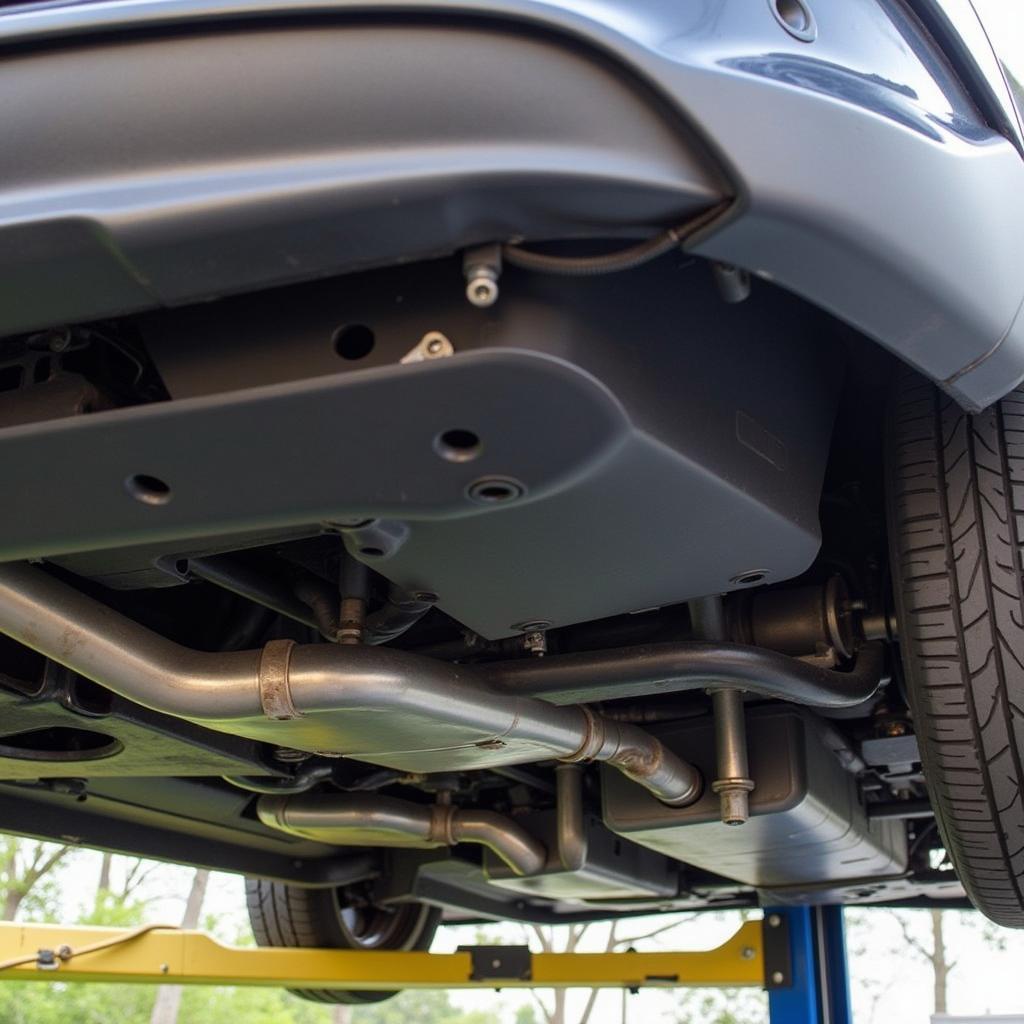Hearing a rattling sound when you start your car can be unsettling. It often signals a potential issue that shouldn’t be ignored. This comprehensive guide will help you diagnose and potentially fix the source of that annoying rattle, getting you back on the road with peace of mind.
Common Causes of Rattling Sounds
Several culprits could be causing a rattling sound when your car starts. Here are some of the most common:
1. Loose or Worn Belts
Serpentine belts and timing belts are essential for running various engine components. Over time, they can become loose, worn, or cracked. This can cause a rattling or chirping sound, especially on startup when the engine is cold and the belt is more rigid.
Solution: Inspect all belts for signs of wear and tear, such as cracks, fraying, or glazing. If you notice any damage or if the belt seems loose, it’s best to replace it.
2. Exhaust System Issues
A loose heat shield on the exhaust system is another frequent source of rattling. The heat shield is a metal plate that protects other car parts from the exhaust’s heat. Over time, the fasteners can rust or break, causing the shield to vibrate against the exhaust pipe, leading to a rattling sound.
Solution: Check the heat shields along the exhaust system for any loose parts. You can often re-secure them with new fasteners. However, if the shield is severely rusted or damaged, you might need to replace it.
 Exhaust System Heat Shield
Exhaust System Heat Shield
3. Problems with the Starter Motor
The starter motor is responsible for cranking your engine to life. If you hear a rattling sound only when starting the car, and it disappears once the engine is running, a failing starter motor could be the issue. This rattling could indicate worn-out gears inside the starter motor.
Solution: Diagnosing a faulty starter motor often requires a professional mechanic. They can test the starter motor and determine if it needs repair or replacement.
4. Worn Pulleys or Tensioners
Your engine uses various pulleys and tensioners to route and maintain proper belt tension. If a pulley bearing wears out or a tensioner weakens, it can cause a rattling sound, particularly during startup.
Solution: Carefully inspect all pulleys for any signs of wobbling or noise. If you suspect a pulley or tensioner issue, it’s best to consult with a mechanic. Replacing these parts typically requires special tools.
5. Engine Mount Issues
Engine mounts are designed to minimize engine vibration and secure the engine to the car’s frame. Worn or damaged engine mounts can cause excessive engine movement, leading to a rattling sound, especially during startup or acceleration.
Solution: Inspecting engine mounts often requires a mechanic. They can assess their condition and advise on whether replacement is necessary.
Troubleshooting Tips
Before heading to the mechanic, here are some steps you can take to try and pinpoint the source of the rattling sound:
- Listen carefully: Pay close attention to when you hear the rattling. Is it only during startup, or does it persist while driving? Does it change with engine speed?
- Inspect visually: Open the hood and look for anything obviously loose, broken, or out of place.
- Check the fluids: Ensure your engine oil, coolant, and power steering fluid levels are correct. Low fluid levels can sometimes cause noises.
- Consult your owner’s manual: Your car’s manual might have specific troubleshooting tips for unusual noises.
When to Seek Professional Help
While some rattling sound causes have straightforward solutions, others require professional expertise. If you’re unsure about the source of the problem or uncomfortable tackling repairs yourself, it’s best to consult a qualified mechanic.
Here’s when professional help is recommended:
- You’ve tried troubleshooting, but the rattling persists.
- The sound is accompanied by other symptoms like engine misfires or warning lights.
- You suspect the issue might be with the starter motor or other internal engine components.
Remember, ignoring a rattling sound could lead to more significant problems down the road. Addressing the issue promptly can save you time, money, and potential headaches in the future.
FAQs
1. Can a loose gas cap cause a rattling sound?
No, a loose gas cap typically triggers a “check engine” light and might affect fuel efficiency but won’t cause a rattling sound.
2. Is it safe to drive my car with a rattling sound?
It depends on the cause. If the rattling is faint and occasional, it might be minor. However, if the sound is loud, persistent, or accompanied by other symptoms, it’s best to get it checked by a mechanic immediately.
3. How much does it cost to fix a rattling sound when the car starts?
The cost can vary greatly depending on the cause. A simple belt replacement could be relatively inexpensive, while a faulty starter motor replacement could be more costly.
Need Help with Car Repairs?
If you’re struggling with a rattling sound or any other car issues, don’t hesitate to contact us at AutoTipPro. Our team of expert mechanics is here to provide reliable and affordable car repair services. Call us at +1 (641) 206-8880 or visit our office at 500 N St Mary’s St, San Antonio, TX 78205, United States. We’ll help you get back on the road quickly and safely.




Leave a Reply